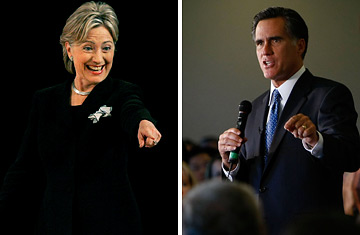
Presidential candidates Sen. Hillary Clinton and former Massachusetts Gov. Mitt Romney
It's that time again — the end of another quarter, and therefore, another financial day of reckoning for the presidential campaigns in a race that has shaped up to be longer and more expensive than any other in history. Will Barack Obama continue to raise money faster and from more people than any Democrat has before, or will Hillary Clinton edge him out in this latest period? Has onetime front-runner John McCain, having upended the organization that had spent his campaign into near insolvency, begun to rebuild his bank account and his viability? How much of his own vast fortune is Mitt Romney going to put into his own campaign, and will that put his total over Rudy Giuliani's?
No one will know the full answers to those questions until October 15, which is the deadline for filing reports with the Federal Election Commission (FEC). The third quarter is traditionally a slow one, because it includes vacation months when donors, like everyone else, are less likely to be thinking about politics. The campaigns are beginning to leak out some information about themselves, and fueling expectations about their opponents'. But the real thing to watch, say political pros, is not the headline-generating numbers that show how much they are bringing in. "The single most important figure that people are going to be looking at is cash on hand, the disposable amount of money that will be available to be spent in the next 90 days," says former FEC chairman Michael Toner, who is now an adviser to Republican Fred Thompson's campaign.
That is because the candidates are moving into the final quarter before the primaries and caucuses begin, an accelerated calendar that requires an arsenal of financial firepower unlike ever before. It used to be that a candidate who did well in Iowa and New Hampshire had a period of some weeks in which to use the good buzz to bring in new donors and contributions. But this time, big states like Florida and California will be holding their contests right on the heels of Iowa and New Hampshire, which means candidates must already have their operations in place.
At least two once-promising candidates — Democrat John Edwards and Republican John McCain — find themselves at a potential make-or-break moment.
When Edwards suddenly announced last week that he would accept public matching funds — and with it, the campaign finance law's spending restrictions — he portrayed it as a move of conviction. "This is not about a money calculation," Edwards told CNN. "This is about taking a stand, a principled stand, and I believe in public financing."
But it was also a move of necessity. Edwards has indicated that he will report having raised somewhere north of $5 million for the quarter, while Clinton and Obama are saying they expect to come in closer to $20 million. Edwards needs the matching funds — up to $20 million or so, based on the number of individual contributors who have given to him — to go up against the well-funded Obama and Clinton operations in the primaries.
Were Edwards actually to win the nomination, that is a decision that could come back to haunt him. From the time he would clinch the nomination until after next summer's Democratic Convention, when the general election campaign officially begins, he would be barred from spending anything. That would make it difficult to defend himself against certain assaults from the G.O.P. Edwards strategists say outside groups could do some of that for him, but when Bob Dole found himself in similar straits in 1996, he was reduced to doing photo ops at gas stations around the Beltway to get attention.
McCain has indicated that he, too, will accept matching funds. He has begun to climb back in the polls, and last week, began his first television ads. But the third-quarter number will be closely watched to see whether his campaign has any real claim to viability. Word in Republican circles is that McCain got some boost with a powerful and intensely personal fund-raising letter he sent out in July that bluntly addressed his campaign's dire situation. "I'm sitting here at 12:33 a.m. at my desk — all alone, writing you this letter," it began. "My wife Cindy has already turned in for the night, and I last spoke with my campaign advisers about an hour ago. I wanted to be alone when I wrote this letter to you, because of the seriousness of what I have to say."
Elsewhere on the Republican side, the real wild card is former Massachusetts Governor Romney, not because of anything that he is doing now, but because of what he has the potential to do in the new year. Starting in 2008, candidates will be required to file finance reports monthly, but those accountings are not due at the FEC until the 20th of the following month. What his opponents expect and fear is that Romney will write himself a huge check shortly after the beginning of the new year to provide himself a massive infusion of funds for the early round of primaries. Not until those contests are all over — and in all likelihood, the nomination is wrapped up — will there be any legal record of how much Romney spent and how.
"He can quite literally write a $20 million, $30 million, $40 million check on New Year's Day, and no one will know," says a strategist for another Republican candidate. "All the campaigns are preparing for that. Everybody knows it will happen, we just don't know when or how big it will be."
